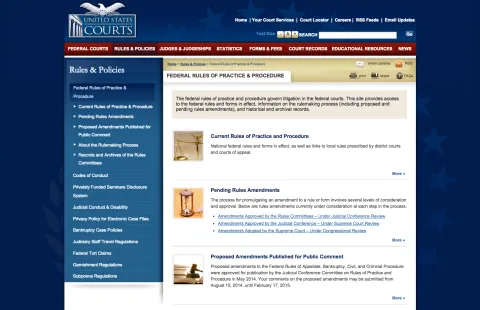The Federal Rules of Practice and Procedure govern litigation in the federal courts.
The Federal Rules of Practice and Procedure govern litigation in the federal courts. Throughout fiscal year 2012, amendments to the Federal Rules moved through various stages in the rule-making process.
Amendments to the Rules
- Public Comment Period: Proposed amendments to the Federal Rules of Practice and Procedure were approved for publication by the Judicial Conference Committee on Rules of Practice and Procedure on June 11, 2012, and circulated to the bench, bar, and public for comment. The public comment period opened August 15, 2012, and closed February 15, 2013. During fiscal year 2012,comments were sought on proposed amendments to the Appellate, Bankruptcy, Criminal, and Evidence Rules, as well as several Official Bankruptcy Forms. Among the proposed amendments published is a substantially revised Part VIII of the Bankruptcy Rules, which governs appeals to district courts and bankruptcy appellate panels. The published proposals are the product of a multi-year project to: (1) bring the bankruptcy appellate rules into closer alignment with the Federal Rules of Appellate Procedure; (2) incorporate a presumption favoring the electronic transmission, filing, and service of court documents; and (3) adopt a clearer and simpler style.
- Pending Review: The Committee on Rules of Practice and Procedure recommended that the Judicial Conference approve amendments to the Appellate Rules and Forms, Bankruptcy Rules, Bankruptcy Official Forms, Civil Rules, Criminal Rules, and Evidence Rules. At its March and September 2012 sessions, the Conference approved the amendments, which will next be transmitted to the Supreme Court for review in fiscal year 2013.
- Completed Rules: In 2011, several changes to the Federal Rules of Practice and Procedure were approved by the Committee on Rules of Practice and Procedure. Throughout fiscal year 2012, the proposed amendments were approved by the Judicial Conference, adopted by the Supreme Court, and then transmitted to Congress. When Congress took no action by December 2012, these rules were enacted. The changes include amendments to Bankruptcy Rules 1007, 2015, 3001, 7054, and 7056, and Criminal Rules 5, 15, and new Rule 37.

The website of the Federal Rules of Practice and Procedure was completely revamped in fiscal year 2012 to give the bench, practicing bar, and public a simpler, more logical starting point to access the federal rules and forms. The rulemaking process is described in plain language and the website provides direct access to the rules, the work of the Judicial Conference’s Rules Committees, and other historical and archival material.
Rules Advisory Committee Activities
The Standing Committee and each of the Advisory Rules Committees typically meet twice each year. Committee meetings are open to the public, except when a committee—in open session and with a majority present—determines that it is in the public interest to have all or part of the meeting closed and states the reason. Meeting minutes are archived online. In addition to these meetings, Advisory Rules Committees may participate in various rules-related programs:
- In September 2012, the Bankruptcy Rules Committee hosted a mini-conference on the effectiveness of certain official forms that took effect on December 1, 2011. The committee invited home mortgage servicers and attorneys (or others who are actually filing the documents), consumer debtor attorneys, chapter 13 trustees, bankruptcy judges, and clerks of court to attend and participate.
- A Civil Rules subcommittee formed after the 2010 Civil Litigation Conference at Duke University continues to implement and oversee further work on ideas emerging from that conference. The subcommittee is considering a package of various potential rules amendments aimed at reducing the costs and delay in civil litigation, and will convene a mini-conference in fiscal year 2013 to elicit the views of judges, experienced lawyers, and academics. A separate Discovery Subcommittee is deeply invested in an ongoing study of issues relating to preservation of electronically stored information and sanctions for failure to preserve such material.
- The Criminal Rules Committee continues to monitor concerns about federal prosecutors' disclosure obligations. In June, the Senate Judiciary Committee held a hearing to examine whether legislative action was needed to reform discovery practices in federal criminal cases.
- In October 2012, The Evidence Rules Committee hosted a symposium on Rule 502 (Attorney-Client Privilege and Work Product; Limitations on Waiver) to review its current use by courts and litigants and discuss ways to make it better known and understood. The symposium proceedings will be published in the Fordham Law Review.
Annual Report 2012
- Annual Report 2012
- Fiscal Year Funding and Cost Containment Initiatives
- The Courts and Congress
- Accountability
- Support for Judges and Court Staff
- Overseeing Facilities, Safeguarding the Courts, and Preparing for Emergencies
- Assistance to Courts and Their Programs
- Improving Service to the Public
- Ongoing Pilots and Projects
- Improving Court Case Management, Financial Systems, and Statistical Reporting
- Using Information Technology to Reduce Costs, Increase Efficiencies
- Supporting Defender Services
- Expanding Supervision Capabilities in Probation and Pretrial Services
- Federal Rules of Practice and Procedure
- In Profile: The Administrative Office of the U.S. Courts
